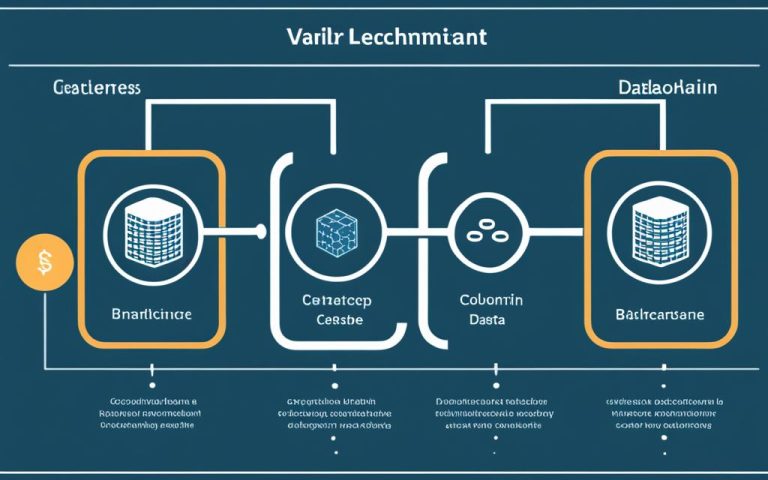Blockchain technology can change industries and boost sustainable business habits. It is a digital ledger that is both decentralized and distributed. This means it offers both transparency and security. Thanks to its cryptographic protection, blockchain makes sure data is safe and reliable. This makes it perfect for encouraging sustainability and ethical business actions.
Blockchain helps make supply chains clearer. This clarity helps spot issues like environmental damage, bad labor practices, and unethical actions in sectors such as fashion, agriculture, and electronicssource. By keeping track of emissions and energy use step-by-step, blockchain can watch and control carbon footprints. This leads to a stronger commitment to carbon neutrality and sustainabilitysource.
Peer-to-peer energy trading on blockchain networks lets people and businesses trade surplus renewable energy directly. This promotes using clean energy and cuts reliance on big power gridssource.
Blockchain also boosts efficient waste handling and helps start a circular economy. It tracks the life cycle of items from making to throwing away. This reduces waste, saves resources, and cuts down on environmental harmsource.
Adopting blockchain can make the global economy fairer, more equal, and sustainable. It helps businesses by making things more transparent, decreasing fake goods, and allowing trust in carbon credit marketssource. Consumers look for products with verified sustainability from blockchain. Plus, businesses using blockchain to manage resources report less waste and better use of resourcessource.
To sum up, blockchain technology has great promise for sustainable business methods. It provides clarity, precision, and responsibility. Blockchain can transform industries and create a more ethical business worldsource.
Enhancing Supply Chain Transparency
Blockchain is great for supporting sustainable practices by making supply chains clearer. Every step is recorded on a ledger that cannot be changed. This lets businesses know where their materials come from and make sure they are ethically sourced.
Blockchain encourages businesses to be accountable and act responsibly. It allows people and groups to check if sustainability claims are true. This helps find issues like environmental damage, poor labor practices, or unethical actions. It encourages openness and responsible conduct in business.
Carbon Footprint Monitoring
Blockchain technology changes the game for sustainability in business. It offers new ways to watch and lower carbon footprints. Companies can now track their emissions better, ensuring transparency and responsibility.
Enhancing Data Accuracy and Traceability
Blockchain records emissions securely at every business phase. Its transparent setup stops data manipulation. This ensures reliable info for carbon footprint checks.
Smart contracts on blockchain automate carbon footprint management. They make instant adjustments using rules about carbon credits or green energy investments.
Fostering a Commitment to Sustainability
Knowing and handling carbon footprints matter for eco-friendly businesses. Blockchain gives a full view of emissions, guiding steps to carbon neutrality.
Businesses show they care about the planet with blockchain’s help. They can invest in clean energy projects like solar or wind farms. It supports making the economy greener.
The Transition to a Low-Carbon Economy
Blockchain helps move us to a greener economy. It allows for better management of carbon emissions. Blockchain encourages sustainable business and renewable energy use.
Companies help fight climate change with blockchain’s carbon monitoring. By adopting blockchain, firms can impact the environment positively and push for innovation and sustainability.
| Benefits of Carbon Footprint Monitoring with Blockchain |
|---|
| Accurate tracking and measurement of emissions data |
| Promotes transparency and accountability |
| Facilitates automation of carbon offsetting |
| Fosters a commitment to sustainability |
| Supports the transition to a low-carbon economy |
Renewable Energy Trading
The energy sector is changing, focusing more on sustainable and renewable energy sources. Blockchain technology is being used to improve how we trade renewable energy. This makes trading faster and more open to everyone.
Blockchain helps create peer-to-peer trading platforms. On these platforms, people and companies can sell extra renewable energy directly to each other. This supports local use of clean energy. It also lets people manage their own energy use without needing traditional companies.
Decentralized power grids are another benefit of blockchain energy trading. They help reduce the need for central power systems that often use fossil fuels. By using renewable energy locally, we make our energy system greener and more sustainable.
Blockchain makes energy trading secure and trustworthy. It stores all details about energy use and trading in a way that can’t be changed easily. Everyone can see and trust these records, which helps more people choose renewable energy.,p>
Also, blockchain lets communities get involved in the energy market. People and businesses can produce and sell their own renewable energy. This approach changes the energy market, making it more about individuals and less about big companies.
Benefits of Renewable Energy Trading:
- Promotes the use of renewable energy sources
- Reduces reliance on centralized power grids
- Enables secure and transparent energy transactions
- Empowers local communities
| Benefits of Renewable Energy Trading | Description |
|---|---|
| Promotes the use of renewable energy sources | Blockchain-based trading platforms help people buy and sell renewable energy easily, encouraging clean energy use. |
| Reduces reliance on centralized power grids | Using local renewable energy cuts our need for traditional power sources, making our energy greener. |
| Enables secure and transparent energy transactions | Blockchain technology keeps records of energy use and sales secure and open, building trust and accountability. |
| Empowers local communities | Blockchain trading lets individuals and companies sell their own renewable energy, making communities more active in the market. |
Waste Management and Circular Economy
Blockchain technology could change waste management and help the world adopt a circular economy. It uses its clear and unchanging records to track products from creation to disposal. This makes sure they are disposed of, recycled, or reused responsibly.
One major hurdle in waste management is recycling or disposing of products correctly. Blockchain lets businesses create a system that rewards people for returning items to be recycled or thrown away. Customers can get tokens or discounts through smart contracts, encouraging them to recycle.
Blockchain-based systems can help reduce waste and save resources, lessening their environmental impact. Its ability to trace materials helps sort, recycle, and reuse waste better. This improves how materials cycle back into use.
Moreover, blockchain can help start marketplaces for recycled goods. It connects those who make waste with those who need raw materials. This helps save resources and encourages working together to help the environment.
Blockchain blends waste management with circular economy ideas to offer a solution to resource loss and harm to the earth. It helps companies use sustainable methods and encourages careful use and production.
Blockchain could significantly benefit waste management and the circular economy. It could reduce trash in landfills, use resources better, and cut down on carbon emissions. Adopting this tech could lead to a greener future for our world.
Conclusion
Our world faces big challenges today, from environmental issues to social ones. Businesses have a big role in making changes for the better. They must adopt sustainable ways of working. This is a must, not just a choice. Luckily, blockchain technology can help businesses on this path.
Blockchain can change many parts of business. It helps make supply chains clear and tracks carbon footprints. With blockchain, businesses can ensure their products come from fair sources. They can also watch and lower their harm to the environment. This moves us towards a better future.
Blockchain also transforms how we use energy. It lets people trade renewable energy directly with each other. It makes the move to renewable energy smoother. This helps cut down on fossil fuels and supports a cleaner energy sector.
Moreover, blockchain is great for creating a circular economy. It makes it easier to manage waste by tracking it transparently. It promotes recycling and cuts down on waste. This helps use our resources better and protects our environment.
Looking ahead, blockchain’s role in sustainable business is huge. It can change finance, sourcing, and even our economy to be fairer and greener. By using blockchain, companies don’t just help themselves. They also help our planet and future generations.
FAQ
What is blockchain technology?
Blockchain technology is a secure and transparent digital record system. It records each transaction in a way that prevents changes or hacks.
How does blockchain support sustainable business practices?
Blockchain boosts sustainable business by improving supply chain visibility. It also helps track carbon output, enables clean energy trades, and promotes eco-friendly waste handling.
How does blockchain enhance supply chain transparency?
It records every supply chain step securely. This lets businesses verify product origins and ensures they follow ethical standards. It leads to more transparency and accountability.
How can blockchain track and manage carbon footprints?
Companies can use blockchain to log their emissions and energy use. They can then balance their carbon footprint by investing in green projects or buying carbon credits.
How does blockchain enable renewable energy trading?
With blockchain, people and companies can trade surplus green energy directly. This supports clean energy use and decreases the need for traditional power sources.
How does blockchain support waste management and the circular economy?
Blockchain keeps track of products’ life cycles to ensure they’re disposed of correctly. It uses smart contracts to reward recycling, cutting down on waste and promoting a circular economy.
How does blockchain contribute to a sustainable business future?
Blockchain helps companies become more sustainable and fair. It opens up new ways for environmental innovation. This leads to a greener, more equitable world for all.



















